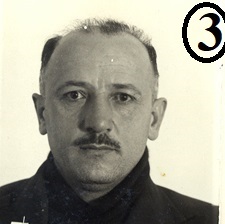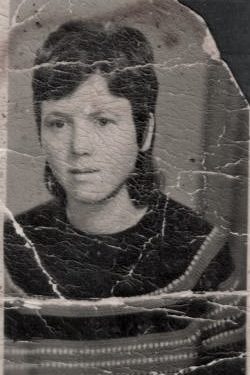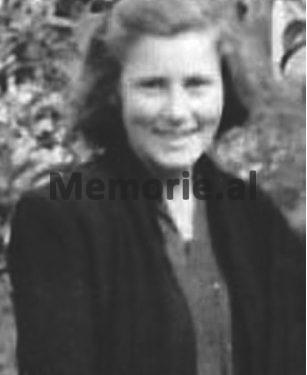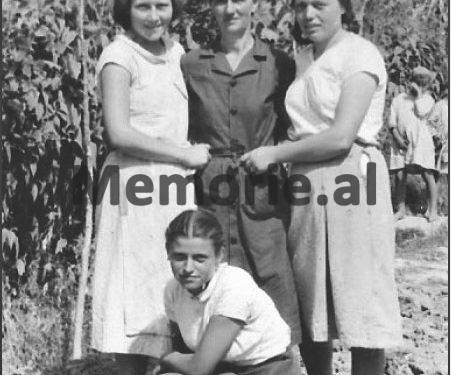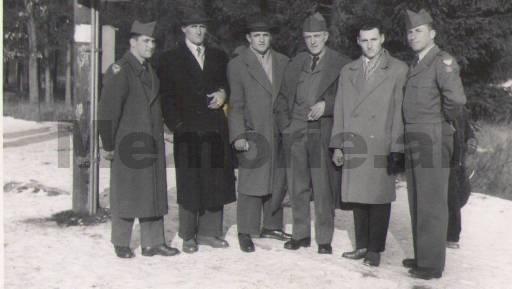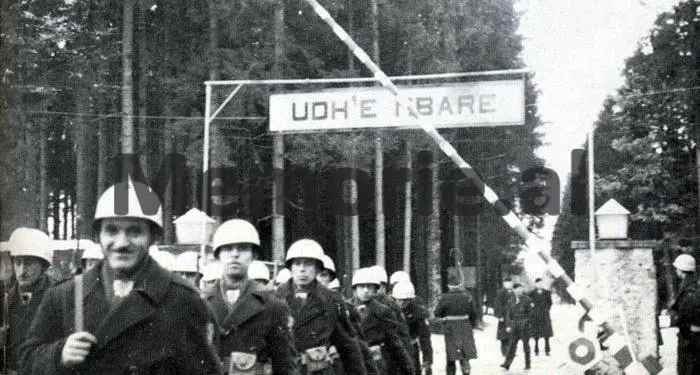By Ermira Isufaj
Memorie.al “When I was only five months old, they took us home, put us in a car and took us first to the Berat camp. The mother was told that the reason for the exile was precisely the fugitive father, described as a traitor to the motherland. The most elite families of the country were sent to this infamous camp, which were a serious danger to the regime of that time. We spent months together with my mother and brother. While the older sister was married to an Italian citizen and she stayed in Tirana. In the camp, my mother fed me with breast milk, because this was the only food.”
This is what Rudina Dema, the daughter of Colonel Hysni Dema, the daughter of Colonel Hysni Dema, a former high-ranking soldier of the Zog Monarchy period with the rank of colonel, who served as the Commander-in-Chief of the Albanian Gendarmerie in the years 1943-’44, with the end of the War, he was forced to leave Albania, settling first in Greece, then in Belgium, etc., while his entire family was imprisoned and exiled, until the year 1991, when the communist regime of Enver Hoxha and his successor, Ramiz Alia, collapsed. For all this, etc., Rudina Dema, one of the daughters of the well-known colonel, originally from the villages of Peshkopia, tells us in her interview.
Mrs. Rudina, what is your and your family’s history?
I am the daughter of Hysni Dema. My father was a colonel and commander-in-chief of the Albanian Gendarmerie during the Second World War. Because in the years 1944-1945, several anti-communist armed uprisings were organized, especially in the northern areas, and one of them was also in Dibër, my father’s place of origin, my father was targeted as their organizer.
At that time, i.e. after the end of the war, we lived in a house in Tirana and one night a group of partisans knocked on the door, who took me out, pregnant with me, wearing my pajamas, in the middle of the street. Together with his younger brother. From the emotional pressure and the blows she suffered, a few days later, she gave birth to me, in the bathroom at home…!
When I was only five months old, they took us home, put us in a car and took us first to the Berat camp. The mother was told that; the reason for the exile was precisely the fugitive father, described as a traitor to the motherland. In this infamous camp, the most famous families of the country were sent, which were considered a serious danger for the communist regime of that time.
We spent months together with my mother and brother. While the older sister was married to an Italian citizen and she stayed in Tirana. In the camp, my mother fed me with breast milk, because that was the only food.
How long did you stay in the Berat camp?
We stayed about a year in that camp. Mother did the most difficult and mundane jobs. On the other hand, she had to breastfeed me and, while she went to work in the morning, I was taken care of by the other persecuted women in that camp. After Berat, the episode of internment would continue in other camps, of course with a long ordeal of torture and inhumane persecution.
Which camp did you end up in next?
First they took us to Kuçovo. There, he tells me, that he remembers the greatest pain of the work of the arm. They forced all the women to work long hours for the opening of the Kuçova Aviation Field. I was only one year old, and my mother worked with all her heart and soul to meet the daily quotas and stimulate her with some extra food…! After this project was finished, we were taken to the Porto-Palermo camp.
It was like a tower on top of a high hill, bordered by mountains on all four sides. In the fort, sunlight never penetrated. The windows were very small. The environment was always in the ground, damp. To sleep, we had stone slabs as a mattress; we drank salty water with worms from the well that was at the entrance to the castle.
The most well-known families of the country, of former high officials from the time of the creation of the Albanian state and after, were interned in that camp, such as: the family of Gjon Marka Gjon, the mother-in-law of the former deputy and Speaker of Parliament Jozefina Topalli, Maria and her daughter, Suzana Topalli, Jozefina’s uncle, Nush Topalli, etc. Maria and her daughter raised me and took care of me all day long.
What kind of care did the Topalli family offer to you?
It is about the years 1945-1950, I was almost five years old. Since I was still a little girl and my mother had to leave for work early in the morning, other persecuted women took care of me, such as the Topalli family. The mother went on foot to the mountain and collected wood, which she carried on her back. Day after day it was almost this kind of work, and other side jobs, that were done in the open fields.
I remember that when my mother came home from work, she would bring me acorns, a kind of chestnut-like grain, which she would then roast and give to me or my brother to eat. They often made us sick because they were intended for consumption by animals (especially pigs) and not for us.
But in those survival conditions, different forms had to be found in order to live. While Maria Topalli, with her daughter, took care of me, as if they had me as part of their family. They fed me, clothed me and changed me.
How did it happen that you were released?
My mother often told me, explaining the situation we were in, that as long as Hysniu, the father, was no longer alive and had not organized other uprisings, he was no longer considered dangerous for the communist regime.
Growing up in the camp, as a child, they could even release me, because I was not a danger. As for the mother, they did not allow it. When I was about six and a half years old, I was released from the Porto-Palermo camp.
My mother had pasted my name on a piece of paper under the dress I was wearing. And just like that, they move me from there and bring me to Tirana, where my older sister was. The mother and brother, about 14 years old at the time, were not allowed to move, they continued to be interned in the camp.
The people who accompanied me left me in Tirana, and I will never forget it, a shop of a Cretan craftsman, which was next to our old house, who saw me crying and approached me to help me.
I showed him the letter that my mother had hidden under my dress and it wasn’t long before the worker took me to the door of the old house where my sister lived with her husband. After he hugged me and we both burst into tears, he immediately took advantage of me and sent me to a barber, who shaved my head. Then, he took me out to the backyard, stripped me naked and washed me with warm water.
Rejoicing in the reality and continuity of days, I believed that hell had come to an end, but in fact I was gravely mistaken. My brother Sazan’s escape from the Porto-Palermo camp would cost me dearly. This time I would return together with my sister, Majlinda.
You returned to the internment camp again, after almost two years. What was different this time?
Sazan’s escape from the camp of Porto-Palermo had also brought his mother to her knees, who was hanged upside down at the entrance to the castle. They had left him for days outside, in the cold, because they asked him to testify about his son’s escape, they suspected that he had escaped to join his father in the mountains and to continue the anti-communist resistance movement.
A few days later, people from the State Security came to my sister’s house, where they had left me, and took me again, to take me to the camp, and to join my mother, who, as punishment, they had moved from the camp of Porto-Palermo, to Savër of Lushnja. I was little, about seven and a half years old, but I will never forget my mother’s face, her tears and her hug, after our reunion under those conditions.
Since I considered myself somewhat older, I also started working in the field. I collected ears of wheat, worked to meet the quota, from breakfast to dinner. While some generous people gave me a hand, helping me.
Days passed, I grew up in the camp, and our life was the same. During this time, I had also started the eight-year school. I would go barefoot to attend those few lessons and return to the field to gather the ears of wheat.
Your movements and life there were controlled, but what do you remember of any particular episode that sticks in your mind?
Almost 20 years passed in the Lushnja camp. Together with my mother and sister, we lived that daily life there, with work, and often some truncated effort, for education. Around the 1970s, the Security people inside the camp were afraid of any possible revolt and escalation of the situation.
That’s why they relocated us from Savra, to Belsh in Elbasan. They reinterned us, in another camp, with more difficult and closed conditions, in terms of security. For the fifth time, I would have another bitter experience, stepping into the next camp, which luckily would turn out to be the last.
Is it true that only you and your sister were interned in Belsh, while your mother, Vasfia, remained in Savër?
Yes, it’s true and that’s the saddest part. We two young girls, who take us and take us to another unknown area. Mother did not come with us and I never learned the reason why she was not allowed to join us. Only a year later, we learned that the mother passed away in that camp, while we, her daughters, did not even have the opportunity to punch her and…!
We started working in an agricultural cooperative. I was working with a pickaxe all day and my hands were bleeding. After almost 30 years spent, moving from one camp to another, in the early 80’s we were released. I was already without a mother, who died in the Lushnja camp, without a father, whom I had never known, except that I remember his portrait, dim, without a brother, who had escaped at the age of 14 and, as I learned later, he had escaped to Germany through Yugoslavia, with a fake passport.
There he married a German citizen, studied at a military academy, one of the most popular in Germany, and, after being awarded military ranks, participated in the Vietnam war. My sister, right after we left the camp, went on with her life, remarrying again, while my childhood and youth were buried at the doors of those infamous camps.
What do you have left today to remember from your past?
Only pain and hard days. My childhood, without childhood and the youth that passed me by, in menial chores. I was left without parents, without a brother, for whom even today, my soul burns. He has been living in America for many years and, since we left the camp, we have not been able to meet.
After leaving the Elbasan camp, I came to Tirana and through some family acquaintances, I started working at the “Stalin” Textile Factory. At the age of 38, I married the goer and from this marriage, today I have a daughter. Memorie.al




